The interpreter’s ghost: Return to Pristina
June 1999: Robert Fisk returns to Pristina, where he meets The Independent’s Albanian interpreter, who he thought was dead

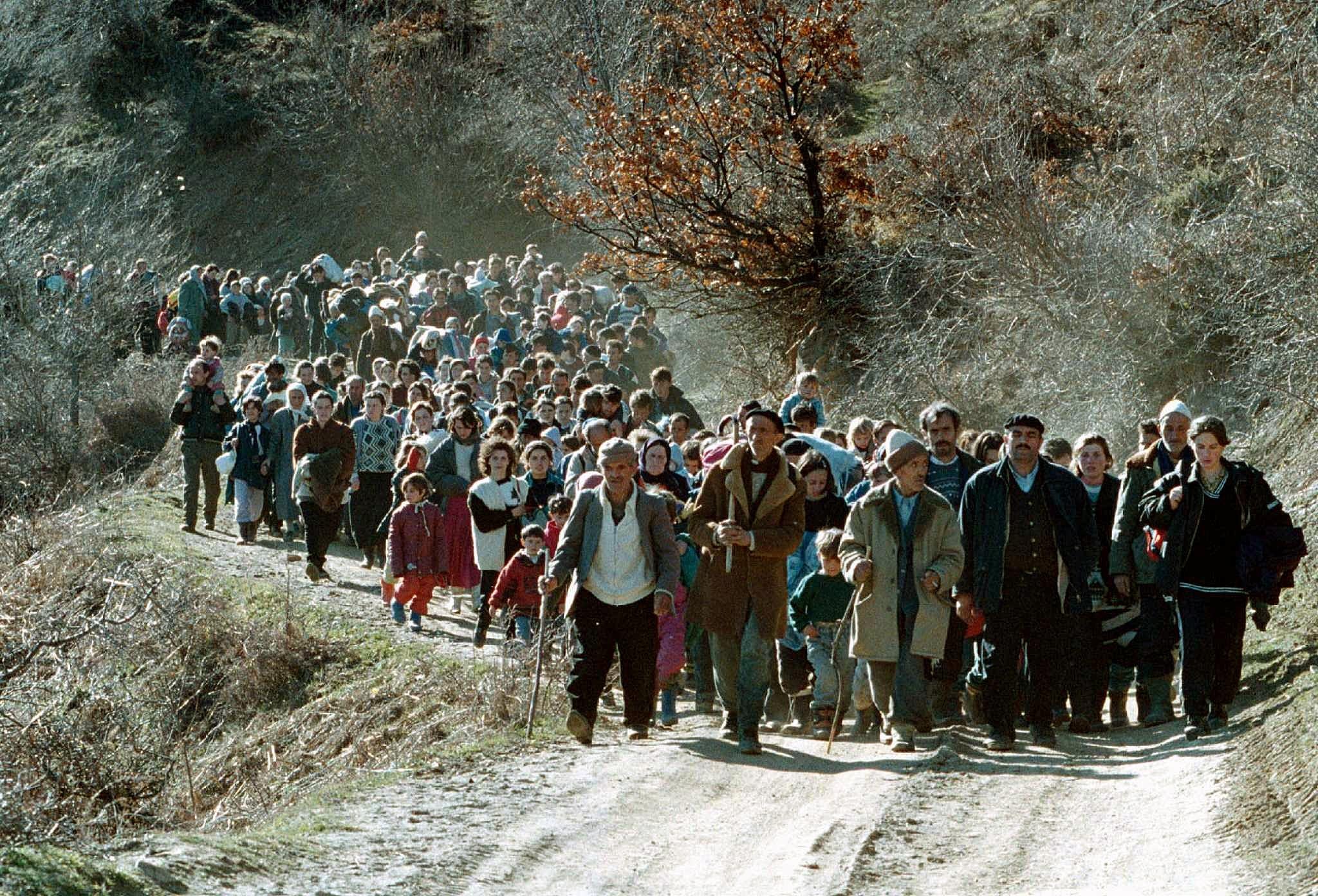
I shall call her Nartila. I recognised her only from her eyes, hunted, frightened and wide with shock when she saw me in the little shop-smashed street. A year ago, Nartila was The Independent’s Albanian interpreter. Yesterday, in the pristine laneway with its channel of sewage flowing through the old Albanian street, she was a ghost.
I had thought she was dead. So had she. “Is it you?” I asked. “I don’t know,” she replied. “Is it me?”
I could describe our walk of half a mile through Pristina, across roads, quickly and in panic, whenever she neared a Serb police or militia station. I could tell how we arrived at an Albanian home where two whole families, clustered in fear – one of the women desperately sick – lived in terror.
But I believe Nartila’s story should be told in her own words, in imperfect English perhaps, but recounted with a desperate kind of integrity. This is what she said to me in the house of two families, with the thick curtains pulled for fear of being seen from the street, and her voice sometimes breaking under the strain of her own memory – the desperate, epic story of an Albanian girl’s survival inside Kosovo with her persecuted people.
“On 23 March [the day before Nato began its bombardment of Yugoslavia], all the Albanians here knew they would be attacked. It was market day. But there was nothing for sale in the market – so we all knew something would happen. Our home area at Vranjevac – in Albanian we call it kodar e trimave, ‘the hill of the brave’ – was 90 per cent Albanians, with four or five Serb families. All the Serb men went to the army and the Serb families started to leave. People were afraid.
“On 24 March, a Wednesday, it was a very bad atmosphere. All people lost control. There was again no food in the market. Nobody had believed Nato would bomb. Now people were afraid for their lives. So when the bombing started, for six days we stayed in our homes, day and night, wearing our clothes in bed in case we had to leave, even wearing our shoes as we slept. I don’t like war; I was a ‘student for peace’, as we called them. But we were in the middle and had no choice for peace or war. There is crazy dancing in this area of the Balkans.
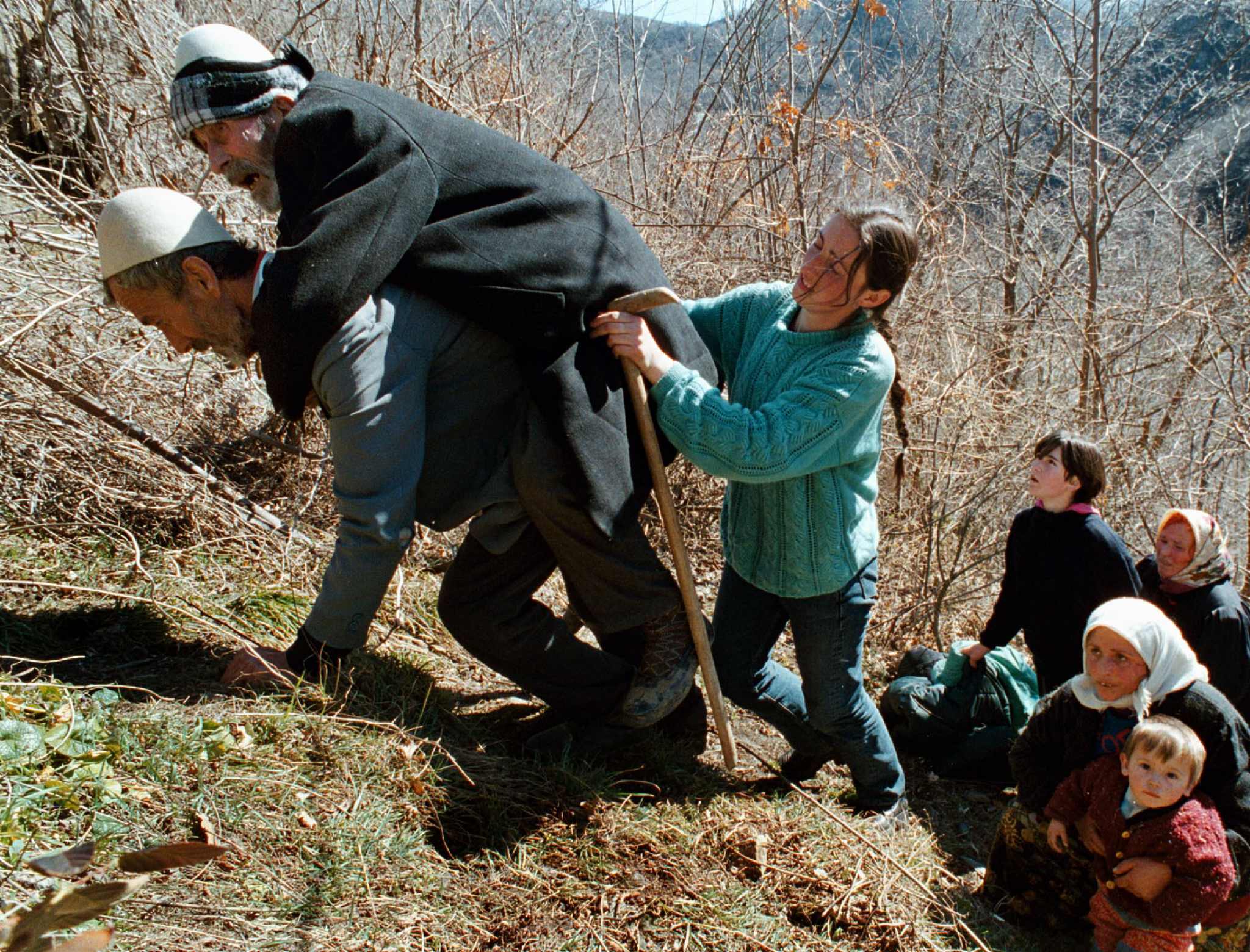
“The [Serb] police started to come every day from 24 March to 30 March, to watch, to observe us. No one was taken or kidnapped. Not then. The day we decided to go out of our houses early in the morning, the police came at 6am and said no one could leave from our road. We waited all day. That morning, the shooting started on the two tops of our hills. Serbs were firing from north and east into a valley in the middle. They were firing with Praga guns, with artillery. We saw two houses burning in Vresta. They were starting to attack our neighbours.
“At 10 that morning, some of our neighbours came and said: ‘The police forced us to leave our homes.’ Those neighbours stayed with us until 3pm. Then they tried to go home but the police forced them to the railway station. Between 5pm and 10pm that night, police came to our street with an armoured vehicle and a civilian car with no registration plates. Some were masked and others had black paint on their faces. They said to us: ‘You have two minutes to leave your house, and don’t close your front doors.’ I fled to another neighbourhood and stayed with a family there. There was a lot of bombing, on the Lukar air base.
We spent that night in a field. It was raining. Babies were crying; the men put plastic over their tractors for protection. There were thousands and thousands with us
“At 5.30am on 31 March, we left this house and started walking away, past a Serb village called Kolovica, and the Serbs there were all mobilised. No one shot at us. Then we carried on walking – by this time, there were thousands of people. I was maybe in the front. They were all civilians, mostly women, old people and children. There were also trucks, cars, vehicles, many with women and children inside. Most people were walking. We walked up this hill and went on walking, from 5.30 in the morning until 7.15 in the evening, all day without stopping until we came to a village called Gebes Marec. We had walked about 40km.
“From Pristina we could hear shooting and screaming when we left. My father was with me – he was 59 – and my mother and two younger brothers and three sisters, and my father had a kind of heart attack. So many people with babies were walking and walking. After seven hours I saw a woman giving birth. It was amazing, this kind of birth.
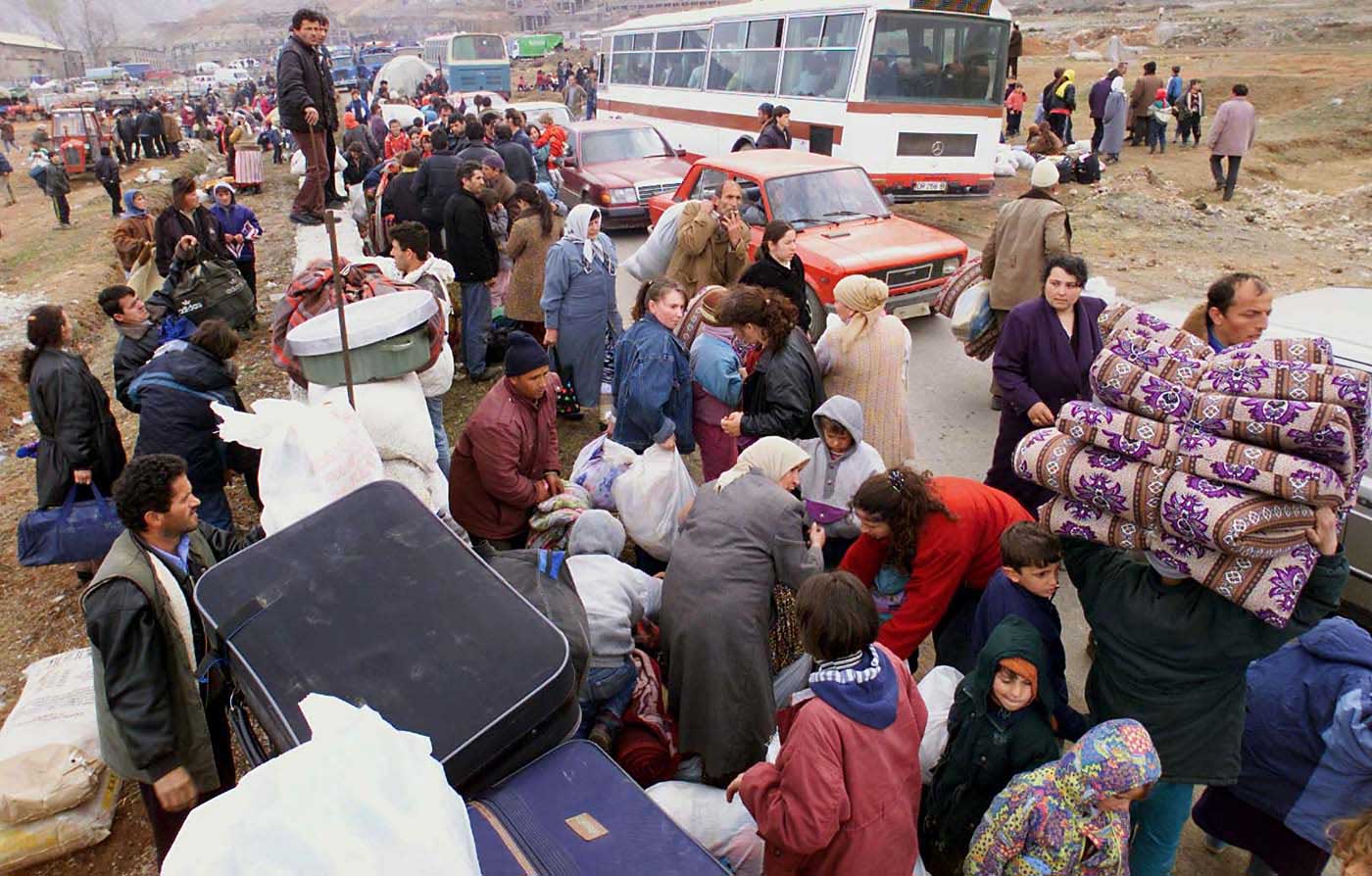
“We walked to the village of Mramor, where the people had to look after us. They took all of us into their houses. Most were sheltered in the schools. We found the home of a distant relative of my father. We had walked then for 13 or 14 hours. We found three or four families already in this house. And we stayed there for three weeks. But the village was all surrounded by Serb police forces.
“The police were all round Novo Brdo and Slivova and Propestica, and they were on the road from Pristina to Leskovac. So we were surrounded on four sides. In the first two weeks they flew over us in military helicopters – with Red Cross signs on the helicopters – to observe us. It was so, so bad. The conditions were hard – no food, no bread, no water, no hygiene. The most important was bread. I ate once every 24 or 48 hours. I didn’t have the wish to eat – we wanted to give the food to the children. There were here more than 1,000 people in 11 homes. The men slept outside in the night – it was so cold we once had snow. Most of the time, it rained.
“Then my family decided to try to go back to Pristina. Besides my father and mother, my brothers and sisters, we had a school friend of mine with us, a brother-in-law and a nephew and his wife. We came near to Pristina in the early morning around 6am. But we found the Serbs were firing in that area, at other Serbs. Some Serb soldiers were deserting to Leskovac and the Serb police were firing at them. All day – 14 April – this fighting went on.
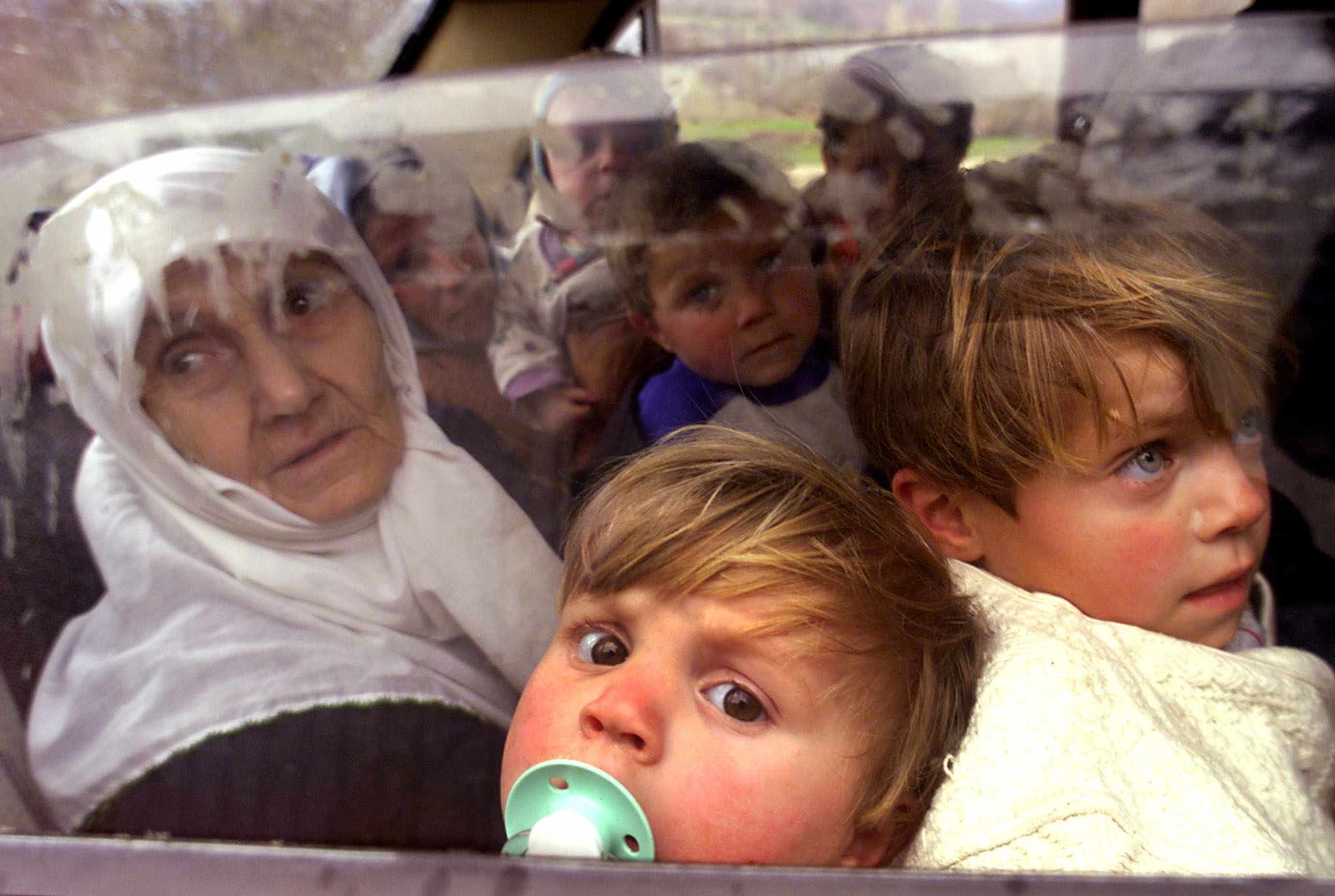
“We went up a hill and tried to sleep in a barn for animals. In the morning, some Albanians came and decided to let us into their houses. We turned back again and moved 15km, from Wednesday to Sunday. On 18 April, an attack on the KLA [the ethnic Albanian Kosovo Liberation Army] started – Slos was a KLA base and there were tanks firing in the hills and radar-guided tracked vehicles with anti-aircraft guns. You can’t fight against that. There was a school in Vitja with 400 people inside and they bombarded it. The people started running away and they fired at another school in Busja. Then the police came at 10 and started to burn all the houses in the valley and then in the hills.
“We were with 50 or 60 people and we ran for 30 minutes and we saw all the houses burning. From 10pm we walked north and along the road west of Pristina, an asphalted road. We walked till 10 in the morning. We spent that night in a field. It was raining. Babies were crying; the men put plastic over their tractors for protection. There were thousands and thousands with us – it was a huge march and we set off from Podujevo. It was such a mass of people. We walked all night under the open sky.
“I had the strength to keep going because I thought that I had to protect my brothers and I had to stay with them. They are all younger than me. Maybe I also had a wish to live, to continue with my life. It wasn’t that I wasn’t afraid. The main thing was to look after my brothers and to come home. They were bombing near the village beside the road and all night my 12-year-old brother was crying because we had lost my parents in the crowd of people. They were ill and travelling in a truck that was going faster than us. To keep my brother quiet, I made jokes and told him children’s stories.
In five days, they took all the money and gold that the people had. I had neither money nor gold. They could only take my heart and my spirit
“It was light at four in the morning and we were frozen and stopped for a time but we decided to go on with the mass of the people and go to Pristina. But the police stopped us at a checkpoint. There was an earlier checkpoint, manned by military of some kind – I recognised one of them, a reservist, he was a postman before the war. He spoke perfect Albanian. They said: ‘No one to Pristina. Turn back.’ We walked 5km back down the road. Around 5.15am some people came and said the police wanted us in two columns, one side of the road the people with cars, the other side those on foot. We joined the column again. It went so slowly. After 500 metres, there was another checkpoint and the men there said in Albanian: ‘Don’t worry – this is Serbia now.’ Another man, seeing the women, said, ‘We’ll have a wedding – look how pretty the women are.’ And other people shouted: ‘We can take out the hearts of the men and take their blood.’ These military people were in green uniforms but with no badges or ID.
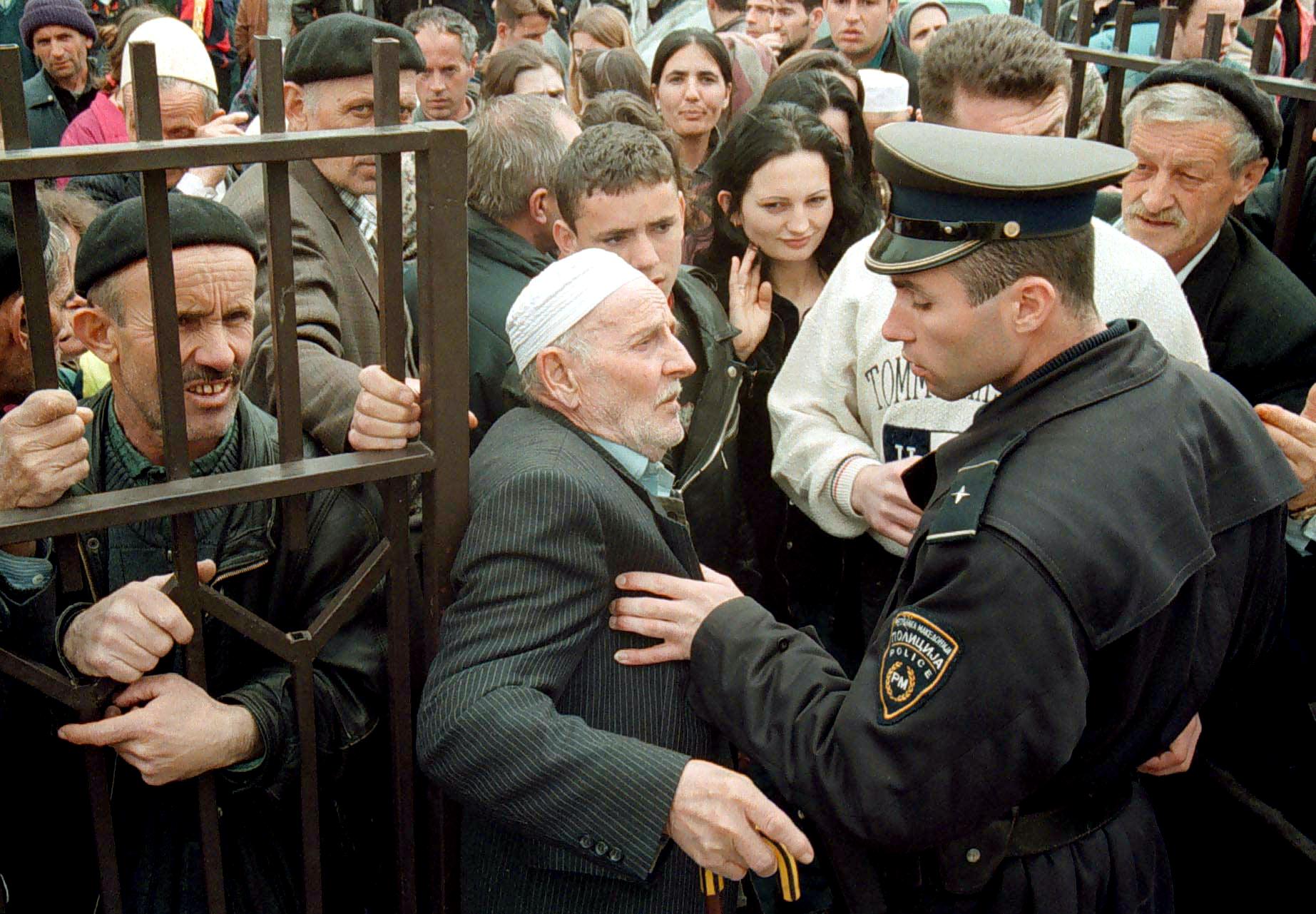
“Then half a kilometre out of Pristina, all of us were stopped by the police. I recognised some of them, but not by name. They were taking and destroying so many of the ID papers of the people. If you said ‘No card’, they said ‘You’re a liar’ and they beat you. I managed to keep mine. They took the ID cards from the people of Podujevo.
“At this checkpoint, something strange happened. They put some women and children in front of television cameras and gave them food and chocolates. Then they showed the tape on RTS [Serbian state television]. Then they started to collect the young people.
“The police would walk along the column and say ‘You’ and ‘You’. But at that moment, a Nato plane came and the police started shouting into their radios ‘Watch out – plane coming.’ One of the policemen shouted at us: ‘You’re all the same [as Nato].’ At that moment, I saw two beautiful young women taken away by the police. They were both under 20, so young, so pretty. They were ordered away from their families. We couldn’t see any more because all of us in the column had been ordered to put our heads down, like this.
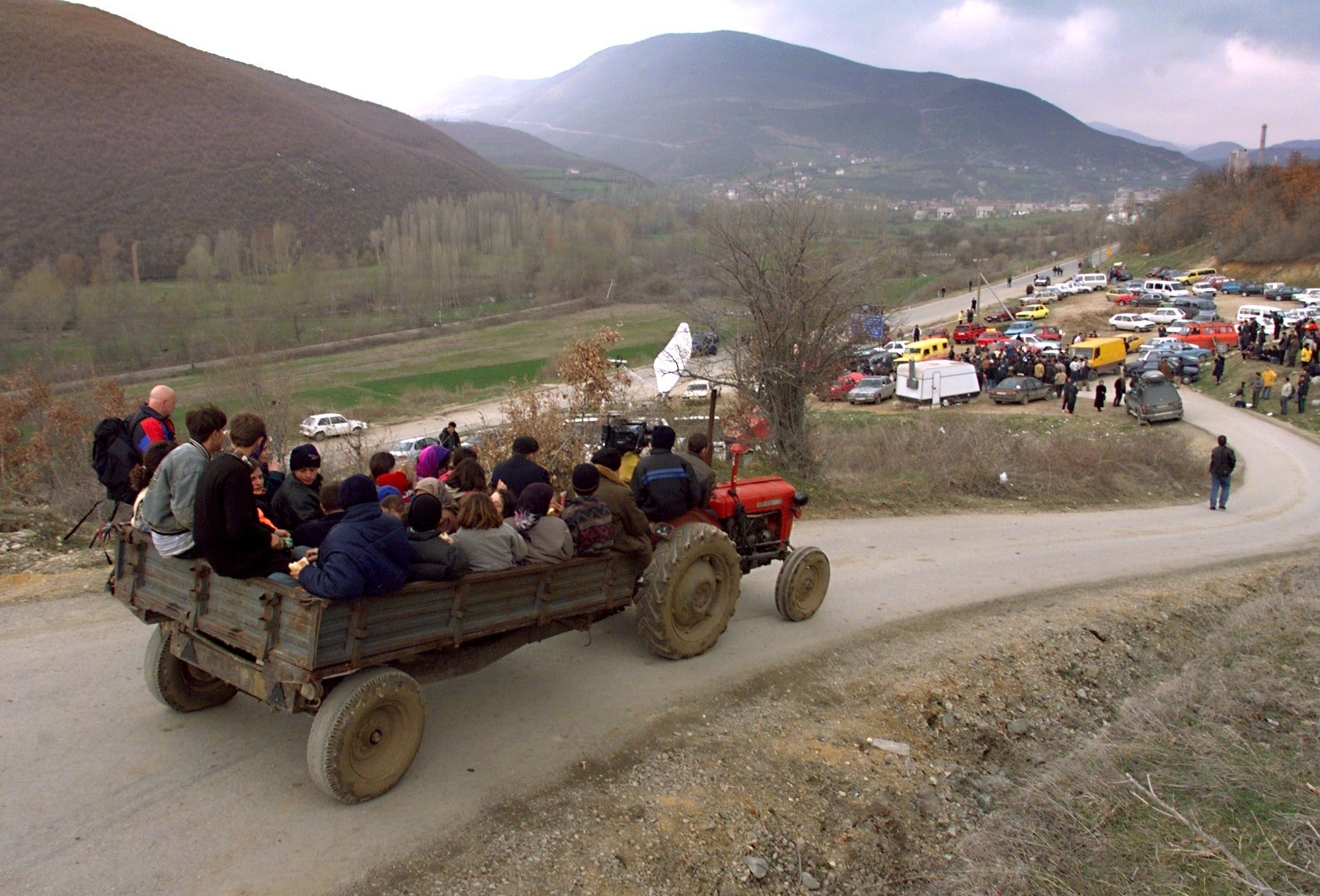
“We were passing a garage at the side of the road and I saw two men taken in there. Afterwards, there was shooting. I only saw young men there but three women were taken to the garage afterwards. Maybe the shooting was behind the garage. There were many men there, mostly students, men of military age – I heard later that three were released from Lipjan prison. They also took a boy of 15.
“We got home and found our dad. My mother arrived later – she had seen so many people taken by the police. The days of 20, 21, 22 April were so dangerous, they took so many people from that column. In five days, they took all the money and gold that the people had. I had neither money nor gold. They could only take my heart and my spirit. We had such luck with that Nato plane. It came down so low that the police panicked and pushed us through the checkpoint. And that is how we escaped. My parents later decided to go to Macedonia but were turned back by the police. I stayed on here because my fiancé was here. They have given us new green cards for identity. Mine says I have ‘Freedom to move on the street’. It was issued by the Ministry of Interior in Belgrade. I don’t know why. Now I go out, only to the market. Sometimes my father does the shopping. But now, in these last days, we fear it will be bad again. Our people tonight are afraid of new massacres or executions.”
That was Nartila’s story, as she told it in the curtain-smothered front room of the Pristina house yesterday afternoon. I asked her before we left whether she thought – since half the Albanian population of Kosovo were expelled after the air bombardment of Yugoslavia began – that Nato should have gone to war. “Somebody must stop this crime in the Balkans,” she said. “In June of 1989, when Milosevic first came to Kosovo, he said: ‘All Albanians will be in Albania.’ That was 28 June 1989, almost exactly 10 years ago. And there were already refugees last year, from Klina, Pec, Djakovica, Drenice and Decani. It’s not just now. It didn’t start in March.”




Join our commenting forum
Join thought-provoking conversations, follow other Independent readers and see their replies
0Comments